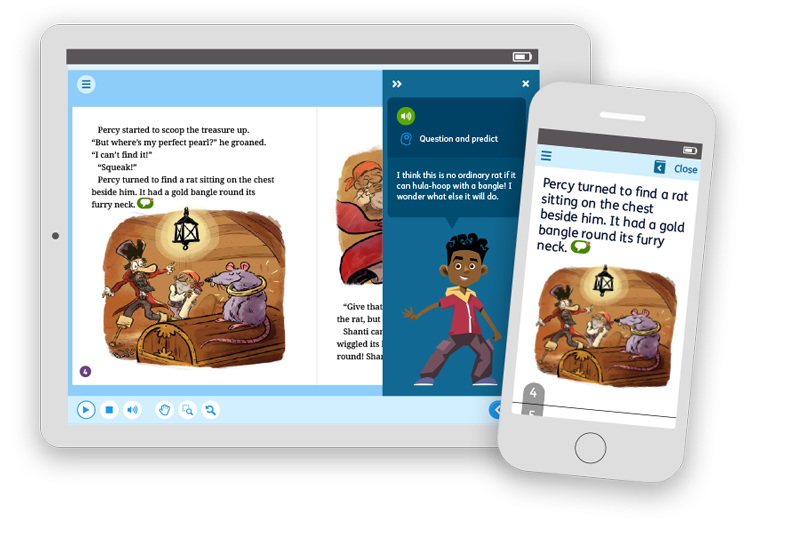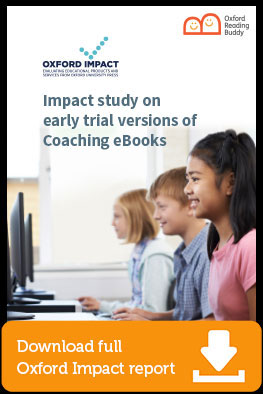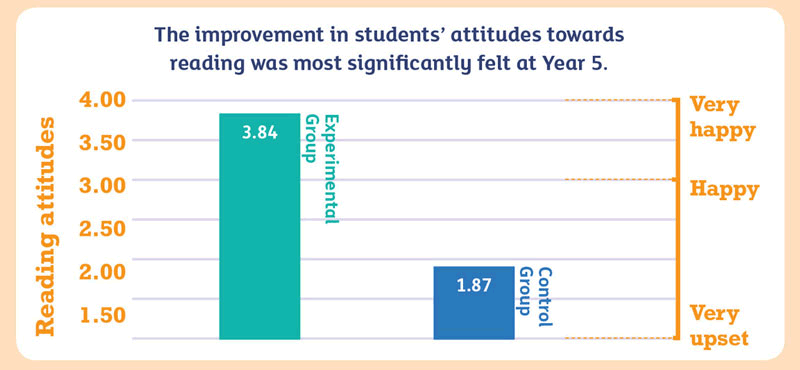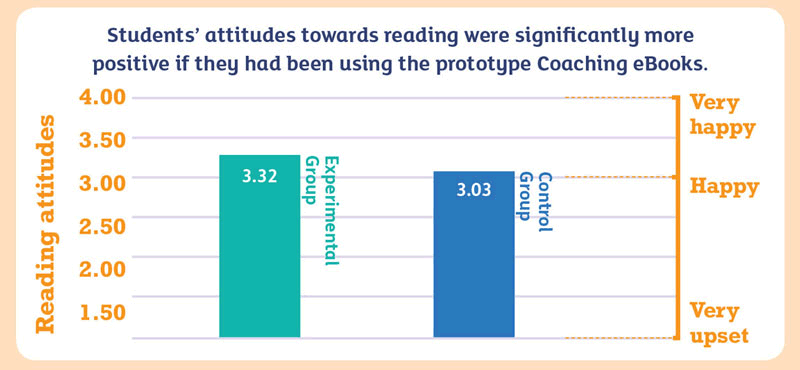

Impact study on early trial versions of Coaching eBooks
Objective of the study
Oxford University Press wanted to find out the benefits and challenges of using prototype (early trial version) Coaching eBooks in order to inform the pre-publication development of this aspect of the Oxford Reading Buddy digital reading service.

Methodology
Researchers from the School of Education at the University of Southampton conducted a Randomized Controlled Trial following three schools, 322 students and 12 teachers for one term (Summer 2018). The six Year 1 and six Year 5 classrooms were randomly allocated into either the ‘experimental group’, who would use the prototype Coaching eBooks, or the ‘control group’, who would not.
Sources of evidence
- Researcher-administered questionnaires that assessed students’ reading attitudes before and after using the prototype Coaching eBooks
- Interviews with teachers
- Classroom observations
- eBook usage data supplied by the system
Resources used in the impact study
Seven prototype Coaching eBooks were specially created for the study. The reading level of the books was the assumed ‘average’ Oxford Level for the year group and the prototype contained a small number of the essential features of the proposed Coaching eBooks such as ‘Reading Buddy prompts’ and ‘Reading Buddy questions’, quizzes, feedback, audio and data-reporting.
Benefits identified by teachers
The Reading Buddy questions helped students reflect on their reading and engage in higher-order thinking skills.
“Reading Buddy questions had the additional: ‘What about this? Have you thought about…?’ I have noticed some children engaging in that and talking it through with themselves.”
School 2, Year 1 teacher
The Coaching eBooks helped engage students with reading by integrating it with ICT.
“Their engagement has been really high with respect to the prototype Coaching eBooks."
School 2, Year 5 teacher
Students themselves saw the value of the Reading Buddy questions.
“What the children found useful were the questions. So, it is the comprehension-type questions. It is always trying to find a fresh approach to get the children to answer questions about the text. There are lots of approaches to reading and to draw the correct information from the text. Actually, Reading Buddy is supportive as a tool for teachers.”
School 2, Year 5 teacher
“The children will get engaged with higher-order thinking questions. But I think that the benefits would show higher up in the school. If they start using it in Year 1, then they will have it in their system.”
School 2, Year 1 teacher
The Coaching eBooks were enjoyable and therefore helped foster a love of reading.
“The children liked it. They absolutely loved all the stories. They were really upset when I didn’t have time, or the laptops broke down and that happened twice. They were really disappointed. They were engaged ...with the stories.”
School 3, Year 1 teacher

Potential benefits identified

Teachers felt that the Coaching eBooks could help bridge the gap between reading at home and reading at school.

It was thought that the comprehension quiz questions could be useful preparation for National Assessments.

Some teachers commented that a service like this could do two jobs at once: engage students in reading and inform teachers about progress against learning objectives.
“For some pupils, to
access it at home will be
a massive benefit.”
School 2, Year 1 teacher


Challenges and impact on product development
| Challenges identified | Impact on pre-publication development of Oxford Reading Buddy | |
|---|---|---|
|
Many teachers felt that insufficient school ICT equipment prevented them from using the prototype to its full capacity.
|
Oxford Reading Buddy will provide clear guidance on recommended usage to ensure that schools understand how all aspects of the service can be integrated to ease teacher workload and increase the impact of learning time. |
|
|
Some Year 1 students found it difficult to access the prototype Coaching eBooks due to forgetting usernames, passwords and not yet possessing sufficient skills in ICT. |
Oxford Reading Buddy is much simpler than the prototype and further refinements have been made as a result of the study to all aspects of the student interface to further improve usability for young learners. |
|
|
A limited capability for the seven prototype Coaching eBooks to address the interests and needs of all students in terms of reading level and motivation. |
The finished Oxford Reading Buddy offers a large range and variety of books for students to choose from.
|
Conclusion
The prototype Coaching eBooks were found to provide a number of significant benefits to teachers and students. Most notably, usage of the eBooks was associated with significantly more positive attitudes to reading, particularly in Year 5. The Reading Buddy questions and quizzes were perceived to encourage deeper reflection on reading and to support comprehension. This pre-publication study also revealed challenges with implementation, which has allowed Oxford University Press to address these challenges in the finished Oxford Reading Buddy service.


Discover Oxford's new digital reading service.
Explore Oxford Reading Buddy


